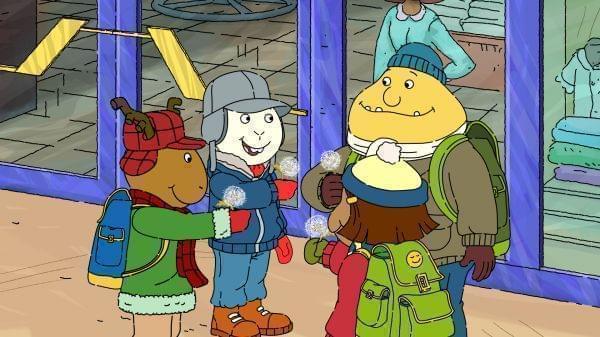The Difference in a Decade

Arthur's pal Buster the rabbit and his friends. Credit: Courtesy of "Arthur" & the other Marc Brown ARTHUR characters and underlying materials (including artwork) ™ and © Marc Brown. Arthur © 2014 WGBH.
Postcards from Buster was a spin-off from the popular PBS afternoon kids' series Arthur. A mixture of animation and live-action, it sent Arthur's rabbit pal Buster around the country to meet real-life children and their families. It was produced in response to a U.S. Department of Education request for proposals that sought to "appeal to all of America's children by providing them with content and/or characters with which they can identify." That request went on to say "Diversity will be incorporated into the fabric of the series to help children understand and respect differences and learn to live in a multicultural society."
Until Buster visited Vermont.
In 2000, Vermont became the first U.S. state to permit same-sex civil unions, and the family featured in the episode "Sugartime" was a two-mommy household. Cue the ominous music.
Let's be clear, in all other respects this was a garden-variety installment of Postcards from Buster. There was no reference to sexuality or politics, no public display of affection. The dual moms were (very) briefly acknowledged, but the rest was kids doing fun things and learning about maple syrup.
That was too much for incoming Education Secretary Margaret Spellings who, on the second day of her new job, fired off a letter to PBS president Pat Mitchell protesting the national broadcast of "Sugartime" scheduled for March 23, 2005. "Many parents would not want their young children exposed to the lifestyles portrayed in the episode," she wrote.
And...PBS immediately caved. They not only pulled the episode from the national schedule, but refused to distribute it at all. The reason given was that the family, meant only as a backdrop to unthreatening maple sugaring, "continued to find its way into the foreground." And perhaps it was only coincidental that the Ready-to-Learn initiative that partially funded Buster was set to expire that year, and that the Corporation for Public Broadcasting was facing a de facto budget cut of approximately 25%. Whatever, those foregrounded moms had to go.
That might have been the end of "Sugartime," but Buster co-producer WGBH-TV in Boston independently offered the program to any public TV station willing to air it. WILL-TV was one of dozens that did so.
Compared to the previous outrage expressed over Tongues Untied and It's Elementary, negative feedback about Postcards from Buster was minimal. We received about as many commendations as we did complaints, though one caller delivered 15 straight minutes of rants, insinuations and threats about my willingness to sacrifice our good work "on the altar of homosexuality."
That was 10 years ago, and it was the last such incident. In my experience, it takes an orchestrated campaign to get the bile flowing. We occasionally get a complaint about this or that show after the fact, but without a determined rally on the part of some self-appointed watchdog, we rarely hear preemptive calls for censorship. Which is fine, because "I don't want to watch it and I don't want anyone else to watch it either" is a demand that runs counter to the nature of public broadcasting.
FYI, should you want to see what the fuss was about, here's a clip from "Sugartime." If you watch, keep in mind that--aside from a single usage of the word "partner" to describe one of the women in the setup to this segment--what you'll see here constiutes the ONLY reference to the nature of their relationship.

